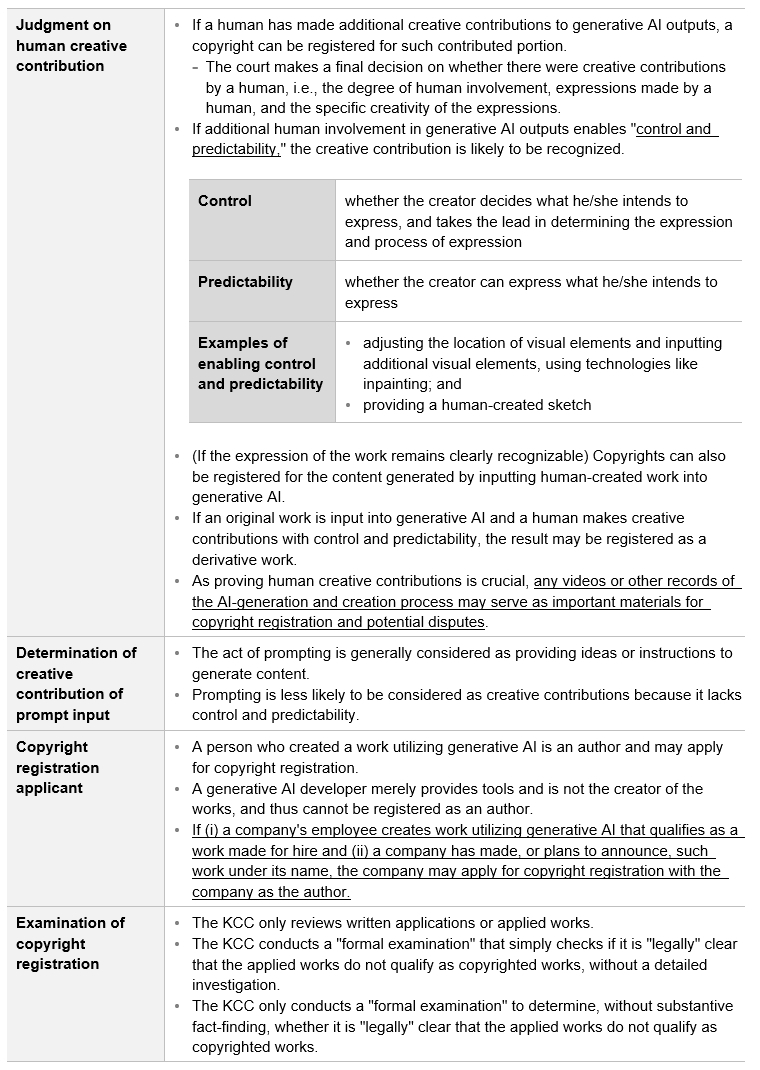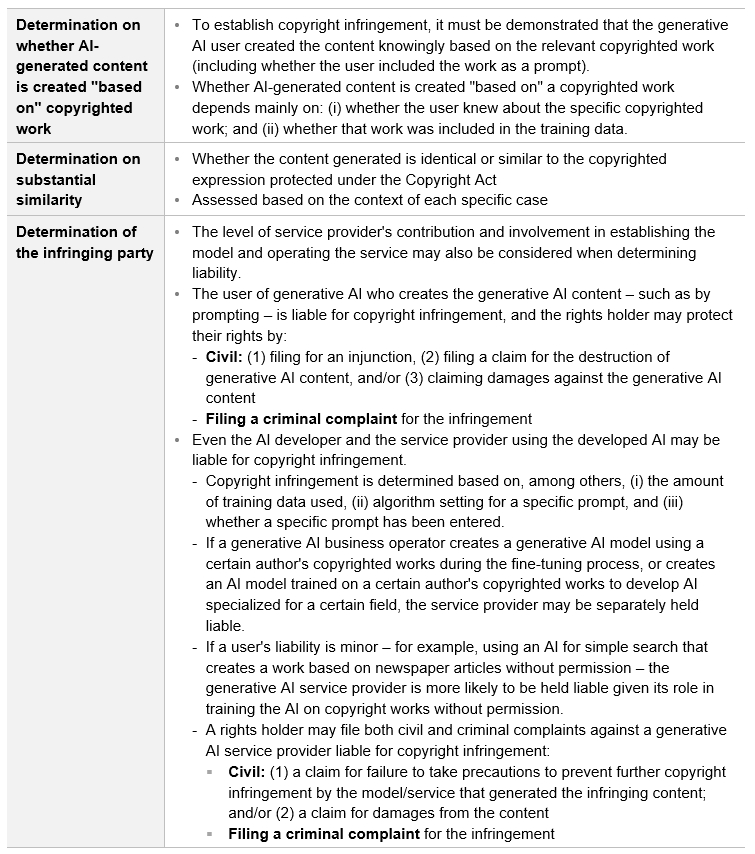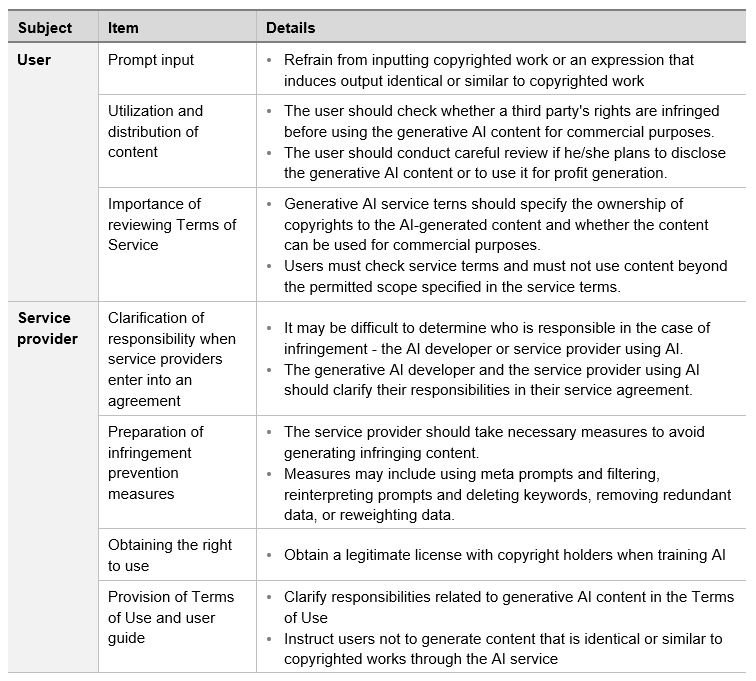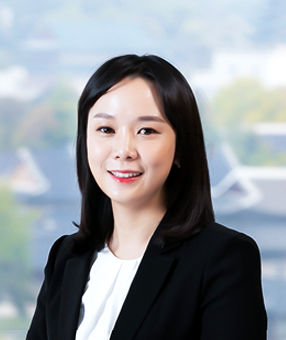Since 2023, the Ministry of Culture, Sports and Tourism (the "MCST") and the Korea Copyright Commission (the "KCC") have been overseeing a public-private joint council called the Artificial Intelligence-Copyright System Improvement Council/Working Group (the "Council"), which functions to address emerging copyright issues in the era of artificial intelligence ("AI").
Following their earlier release of the "Guidelines on Generative AI and Copyright" (the "2023 Guidelines") on December 27, 2023, together with inputs from the Council, the MCST and the KCC published the following guidelines on June 30, 2025:
- Guidelines on Copyright Registration for Works Utilizing Generative AI (the "Copyright Registration Guidelines")
- Guidelines on Prevention of Copyright Disputes Involving Generative AI Content (the "Copyright Dispute Prevention Guidelines")
Based on the discussions at the "AI-Generated Content Utilization Division" of the Council in 2025, the new guidelines address: (1) copyright registration for content produced using generative AI ("generative AI content"); and (2) prevention of copyright infringement by generative AI content.
In this newsletter, we first briefly highlight the key points from the earlier 2023 guidelines and then outline the key details of the new 2025 guidelines.
1. Summary of Key Points from the 2023 Guidelines
On the eligibility of copyright registration for generative AI content, the 2023 Guidelines provide that:
- Copyrights cannot be registered for outputs without human creative intervention.
- If any "additional work" creatively made by a human modifies, adds to, or subtracts from AI-generated outputs qualifies for copyright protection by itself, a copyright may be registered only for such additional work.
- If human creativity is added to AI-generated output through editing or arrangement, such portion can be registered as a "compilation work."
On copyright infringement from using generative AI, the 2023 Guidelines take the following key positions:
- Generative AI users may infringe copyrighted works of others by producing the "outputs identical or similar to copyrighted works."
- AI service providers are advised to filters so as not to produce AI-generated outputs that are identical or similar to copyrighted works.
- Copyright infringement disputes of AI-generated outputs may lead to controversies among AI service providers about who is liable and to what extent. Foundation model providers and businesses using foundation models are thus advised to clearly define their liabilities and the relevant scope of the liabilities in their service agreements.
2. Copyright Registration Guidelines
The Copyright Registration Guidelines classify (i) generative AI content for which human creative contribution is recognized and can be registered as "work utilizing generative AI," and (ii) those that are not as "generative AI outputs." The Copyright Registration Guidelines also provide key examples of works utilizing generative AI and copyright registration cases:
- Where the generative AI content created by user's input of his/her work as a prompt shows the creativity of the user's work
- Where the user's "additional work" of modifying, adding to, or subtracting from generative AI outputs shows creativity
- Where the selection, arrangement, or configuration of generative AI outputs shows creativity
In addition, the Copyright Registration Guidelines set out criteria for registering works created using generative AI; the key details are summarized below.

3. Copyright Dispute Prevention Guidelines
The Copyright Dispute Prevention Guidelines provide more specific standards for determining (i) copyright infringement of generative AI outputs in the service (generation) phase and (ii) the infringing party (i.e., liabilities), although they do not cover issues arising during the generative AI training phase.

The Dispute Prevention Guidelines also make recommendations for generative AI users and service providers:

4. Implications and Prospects
The new guidelines provide valuable direction to respective stakeholders, including AI service providers, copyright holders, and AI users amid the absence of direct and specific laws, regulations, or court precedents, and clarify the 2023 Guidelines. While not legally binding, they can be an important reference for interpreting and enforcing the Copyright Act in the face of rapid expansion and legal uncertainty with the growing use of generative AI.
However, the guidelines are not comprehensive. Instead, the Copyright Dispute Prevention Guidelines expressly excludes issues arising during the training phase of generative AI, which are expected to be further discussed by the "AI Training Data System Division" and the "AI Training Data Transaction Promotion Division" of the Council.
The MCST has also expressed its willingness to pursue legislation regarding text and data mining exceptions, disclosure obligation for AI training data, and publicity rights as indicated in its "Key Tasks Implementation Plan for 2025" and "Culture Korea 2035." Therefore, it is important to continue to monitor legislative and policy discussions.
Related Topics
#AI #Copyright registration #Copyright dispute prevention #2025 Issue 3








